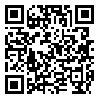Volume 19, Issue 6 (2-2021)
TB 2021, 19(6): 63-76 |
Back to browse issues page
Islamic Azad University , mmohamadis@yahoo.com
Abstract: (1511 Views)
Introduction: Overweight and obesity is one of the physical consequences of binge eating disorder. The aim of this study was to determine the effectiveness of life style intervention on weight management using choice theory to reduce the severity of binge eating in women who suffered from binge eating. Methods: In this experimental study with pretest and posttest design, 45 women who suffered from binge eating disorder with BMI ≥ 25 and within the age range of 20- 60 years were selected using available sampling method. They were categorized randomly into the intervention, diet, and control groups (Groups of 15 people). The Gormally's Binge Eating severity Scale was used to assess binge eating. Data were analyzed by SPSS/24 software. Results: The average scores of BES and BMI of the experimental group decreased significantly compared to the control and diet groups in the post-test stage and this decrease remained relatively constant in the follow-up stage. The results showed that lifestyle modification intervention using Choice Theory was effective in reducing the binge eating severity (p <0.001) and reducing body mass index (p <0.05) in women with binge eating disorder. Conclusion: The lifestyle intervention with “choice theory” decreased the binge eating severity and body mass index of women who suffered from binge eating. Hence, it is recommended that health and other organizations apply this treatment.
Type of Study: Research |
Subject:
Special
Received: 2020/01/27 | Accepted: 2020/07/21 | Published: 2021/02/28
Received: 2020/01/27 | Accepted: 2020/07/21 | Published: 2021/02/28
| Rights and permissions | |
 |
This work is licensed under a Creative Commons Attribution-NonCommercial 4.0 International License. |




